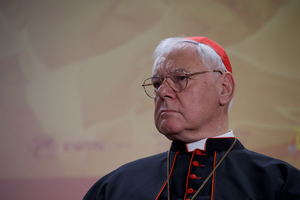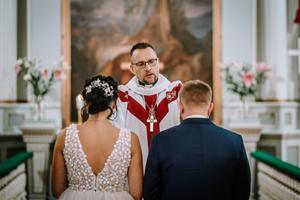The Jesuits Meet to Elect a New Superior General — What’s in Play
The order’s communications director, Jesuit Father Patrick Mulemi, explains to the Register how the election will be conducted and what kind of leader his order is seeking.

ROME — Starting on Oct. 2, Jesuit leaders from around the globe have been gathered in Rome at the 36th General Congregation of the Jesuit Curia. At the general congregation — the 36th such meeting since the Jesuits were founded by St. Ignatius of Loyola in 1540 — participants will elect a new superior general to replace Father Adolfo Nicholas, who is retiring following eight years of service as the religious order’s leader.
In an Oct. 6 email interview with the Register, Jesuit Father Patrick Mulemi, director of communications for the Society of Jesus, discussed the qualities that a superior general needs to possess, how the election will be conducted and what influence the first Jesuit pope in the history of the Church might have on the deliberations.
How is the superior general elected? What is the procedure, how many electors are there, and how are the electors chosen?
Of the 215 members of “GC36,” 212 are participating as electors, i.e., they will take part in the election of the new superior general. One requires an absolute majority to be elected; in this case, 107 votes. There is an explanation of the election procedure on the congregation website; see the following link for more: http://gc36.org/how-will-the-congregation-elect-the-new-superior-general/.
What criteria are important in choosing a superior general?
Part 9 of the Jesuit Constitutions describe the kind of person the superior general should be:
a) He should be closely united with God and intimate with God in prayer.
b) He should be a model of virtue, resplendent in charity and genuine in humility.
c) He should be composed, self-composed while speaking, well-tempered, prudent in judgment and a model for all Jesuits. When he rectifies a situation, he should do so in a way that is sympathetic and just.
d) Magnanimity and fortitude of soul are likewise highly necessary qualities.
e) He should be endowed with great learning, understanding and judgment, as well as be prudent and discreet.
f) When he exercises business, he should be vigilant and solicitous to undertake enterprises as well as energetic to carry them through to their completion and perfection.
g) He should have a good reputation, be held in high esteem and be edifying to those he governs.
h) He should have been well known over time to be outstanding in these virtues.
How much are candidates from Asia and Africa being considered? Is the fact that many vocations are coming from those continents an important factor to consider in the elections?
In the election of a Jesuit superior general, there are no candidates. Everyone is taken as seriously as everyone else. Thus, in the days leading up to the election, the electors are discussing the document De Statu Societatis (The State of the Society). The discussions on De Statu Societatis should help the electors see the real situation of the society today and what kind of person the society needs today. Hence, for the electors, the question is not “Where does the person hail from?” — it is not about giving a chance to Africa, Asia or Latin America — but, rather, given the situation of the society today, “Who is best suited to lead the society?”
What effect is our Jesuit pope having on the election and the general congregation generally?
There is no effect of a Jesuit pope on the election or on the general congregation. At every general congregation, we ask ourselves questions such as: “How do we define our mission as Jesuits today?” “How best can we be at the service of the Church today?”
It is, therefore, not a question of the Pope being Jesuit. Rather, the society is at the service of the Church and of the Pope as the Vicar of Christ. For St. Ignatius, as for Jesuits today, the Pope as Vicar of Christ is very important, regardless of who the person might be. That is why Jesuits take a special vow of obedience to the Supreme Pontiff.
There has been growing criticism of the Society of Jesus over the past 50 years — that many Jesuits have become too human rather than Christ-centered, have taken on many secular mores and are generally more concerned about social-justice issues than the salvation of souls. How much are these criticisms being taken seriously in this year’s general congregation and in the election of a new superior general?
As I mention above, at every general congregation, the society has asked herself to self-define and to define her mission in the Church and in the world. In 1974, General Congregation 32 defined the mission of the society thus: “The mission of the Society of Jesus today is the service of faith, of which the promotion of justice is an absolute requirement. For reconciliation with God demands the reconciliation of people with one another” (GC32, Decree 4, No. 2).
Thus the concern about social justice over the years has been a response to the invitation of GC32 and subsequent GCs, which confirmed the same mission.
In General Congregation 36, two of the main discussions will be on the renewal of governance and the renewal of our life and mission. These discussions will define the mission of the society today and shape the direction the society takes in the coming years.
Is there concern among any of the Jesuits taking part in the general congregation that the society has lost touch with the original charism and constitutions laid down by St. Ignatius?
There is no concern that the society has lost touch with the spirit of the constitutions laid down by St. Ignatius. The concern is: How best do we live out the spirit of the constitutions in the world that has changed significantly in the last 476 years of the existence of the society?
When can we expect a result of the election?
The congregation determines when it is ready to take the step towards the immediate preparation of the election. At this moment, the members are still discussing the De Statu Societatis, and there is no indication when that conversation will be concluded.
Edward Pentin is the Register’s Rome correspondent.
- Keywords:
- edward pentin
- jesuits
- st. ignatius of loyola

















